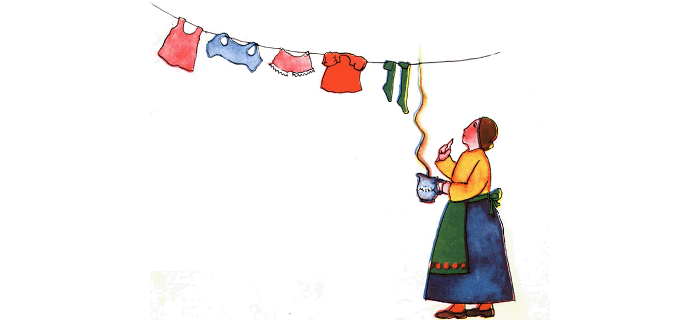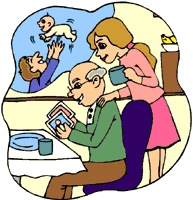Making Arrangements

One of the toughest things about living with my parents is the thought of not living with them. The realization that, the older they get, the closer we get to a time when they won't be there for me any more. I try not to be morbid about it, but every now and then I find myself obsessively reading the obituaries in the newspaper, checking the birth dates, and hoping for that elusive sense of relief that I feel when I discover (more infrequently these days) that all the people listed were born ten or fifteen years before my parents. I don't like thinking about mortality--mine or anyone else's--but this week it has been unavoidable, because my father has insisted on discussing his will.

Avoiding the Issue
I've been avoiding the issue , not by physically avoiding my father--that would be hard to do, since my parents live upstairs from us--but verbally, with my vain attempts to change the subject every time he brings up his pet topic of the week. Since one of my uncles died a few weeks ago, my dad seems to have become fixated on his own "arrangements." He has also had a bad case of the flu in the past week or so, which, combined with his progressive Parkinson's disease, and his frequent angina episodes, has left him feeling weak, depressed, and fatigued. But I didn't realize, until a few days ago, that he was feeling bad enough to be considering his will.
Yes, I know that everyone should have a will--that death can strike at any age, and that certain things have to be dealt with ahead of time--but there's something about discussing it with my parents that really gets to me. It's not just the fact that by admitting their mortality, I am admitting my own. It's more than that. It has something to do with the realization that, at this point in our lives, they are beginning to look to me for advice and support in the same way that I used to, and still do, look to them. That our relationship has come full circle in some way.
I have spent my life relying on my parents to "make things right"--to help me take care of wounded pride, broken hearts, difficult landlords, unexpected bills, and much more. Now it's time for me, as their only child and de facto "caregiver," to make things right for them--to get the forms, to help them with the wording, to deal with the notarization--and to be "grown up" about it, rather than disintegrating into a scared, sad little girl who is most terribly afraid of losing her Mommy and Daddy.

The "Arrangements" Dance
So they bring it up, and I sidestep it. Then they bring it up again, and I go and put the kettle on for tea. Then they bring it up again, and I clear away the dinner dishes. But finally, last night, they had me cornered. We had to talk about it, and we did. And you know, it wasn't so bad.
Even though the thought of my parents not being around any more is one of the most frightening things I can imagine, there was something almost comforting about finally getting it all out in the open--accepting the fact that arrangements need to be made, and making them as a family, instead of as a series of unilateral decisions. They tell me that they are getting their lives "in order" for the future--not their future, but mine--and because of this, they need me to participate in the process.
To my father, the most important thing is not the money--he isn't a wealthy man--but the security of my mother, myself, and my family. When my father is no longer around, my mother will be left without any credit rating to speak of. She will have to transfer utilities and accounts into her name, as well as the ownership of their car, and so on. From my vantage point as "modern woman," it amazes me that my mother's life could be made so potentially complicated by the lack of a paper trail of numbers, accounts, and possessions in her name, but it's a fact that we have to deal with.
Also, my mother is 7 years younger than my father, and in much better health; and he is so determined that she will outlive him, that he refuses to entertain, even for a moment, the possibility that she might not. So, right now, one of the driving forces of his life is to make sure that she is provided for.
But most of all, I think that my dad is looking for some sense of emotional closure. Even though he promises me that he will be around for years, I think he's feeling the need to deal with the fact that he is 70-something, and not in the best of health. In fact, this may be one of the few remaining areas of his life that still allows him to feel some sense of direction or control. I realize now that by refusing to discuss the issue with him, I was taking this control away from him--invalidating his desire to "square things away," as he puts it.
I sometimes forget that, even though his voice is softer than it used to be, and the neural damage caused by his Parkinson's disease sometimes makes it difficult for him to get his point across verbally, he still has the same strong will, obstinate pride, and vibrant, focused personality that he always has--and these small victories and brief moments of self-determination keep him going.
Recently, I extracted a solemn promise from my father that he will be around to see my daughter graduate from high school in 2014. By then, my dad should be 89 years old. I really hope he keeps this promise--he hasn't broken one yet. But for now, if making his will will keep him happy, I will sit down with him tomorrow and help him make it. And I promise not to cry.
Sonia Michaels is a writer, parent and homemaker, and the owner of The Magic Wardrobe, a home-based maker of handcrafted knitwear for children and nursing mothers. She lives in Victoria, BC with her husband, daughter and parents.
